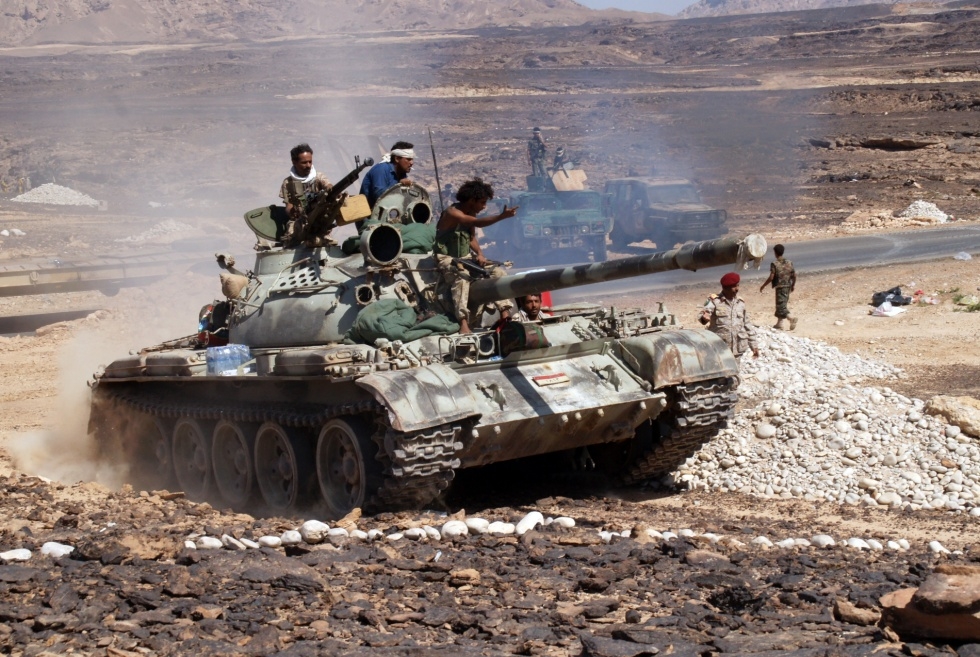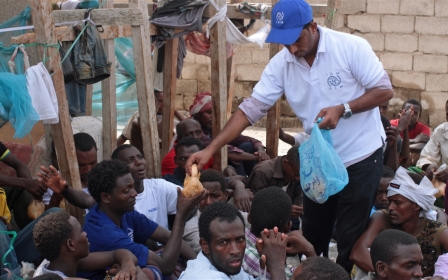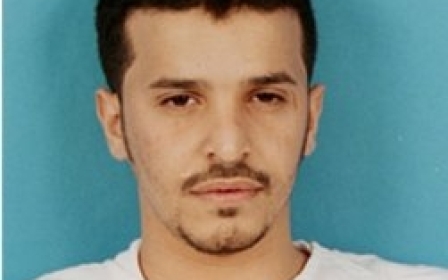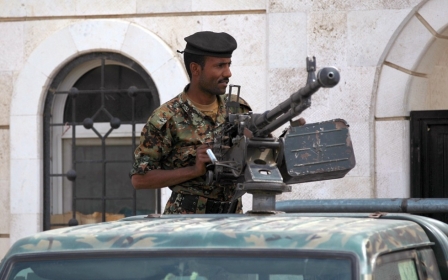War on al-Qaeda drones on in Yemen

A drone strike killed six al-Qaeda suspects in Yemen's east on Monday, the first such raid since government troops launched their biggest offensive on the jihadists in two years, tribesmen said.
In the capital Sanaa, the US embassy announced that the mission "will remain closed for consular services through May 15," adding that it could remain shut for even longer depending on the situation.
The pilotless aircraft deployed over eastern Yemen on Monday targeted a vehicle near Al-Husun, a village in Marib province, killing at least six "al-Qaeda members", tribal sources told AFP.
The United States is the only country operating drones over Yemen, but US officials rarely acknowledge the covert programme.
On 5 May, AFP reported that the US had renewed a 10-year contract to lease its air base on the coast of Djibouti.
New MEE newsletter: Jerusalem Dispatch
Sign up to get the latest insights and analysis on Israel-Palestine, alongside Turkey Unpacked and other MEE newsletters
Camp Lemonnier, described by Barack Obama at the meeting as a 'critically important' in the US counter-terrorism strategy in the region, lies approximately 700km by air from Yemen's Marib province.
There have been conflicting conflicting reports in the Yemeni media as to whether the strike was carried out by Yemeni air planes or American drones.
A Facebook post by a user called Muhammad al-Yemeni reflects some confusion among readers:
'Was it a Yemeni plane that launched the air strike that targeted members of al-Qaeda in Marib province this morning? Or was it American drones in a return to their previous policy, after strikes were halted at the outset of the army's offensive against al-Qaeda militants in Abyan and Shabwa?'
Yemeni news site Aden Online is now reporting that 'armed tribesmen' have targeted a crude oil pipeline running through Marib province.
According to their report, oil flow has been halted since the attack, which was made in retaliation for the earlier drone strike that reportedly killed four men from the Al Shabwan tribe.
On 6 May, the same pipeline came under attack on two occasions within a 24-hour period.
The past week has seen an uptick in attacks allegedly carried out by members of Al Shabwan, whose leader strongly refuted on Sunday any link between the tribe and al-Qaeda.
One Twitter user expressed uncertainty regarding rumours currently surrounding the tribe:
Translation: If all this talk is true, then Al Shabwan is a terrorist organisation according to the majority of international legal classifications
Yemen's army says it has inflicted heavy losses on Al-Qaeda in the Arabian Peninsula since it launched a major offensive against its strongholds on 29 April.
But suspected AQAP militants have carried out attacks in apparent revenge for the offensive.
AQAP is regarded by Washington as Al-Qaeda's most dangerous franchise and has been linked to failed terror plots in the United States.
On Monday, militants opened fire on an army convoy heading from Azzan to Huta, in the southern province of Shabwa, a military official said, prompting an exchange of fire between both sides.
Troops on Thursday announced they had entered Azzan, which had been a jihadist bastion in southern Shabwa province.
The interior ministry said, meanwhile, it has beefed up security in several provinces to prevent likely attacks by jihadists and infiltration by Somali jihadists.
US extends embassy closure
Fears of reprisals as well as a spate of attacks against foreigners prompted the United States to close its embassy in Sanaa last Wednesday.
The State Department "has been apprised of information that, out of an abundance of caution and care for our employees and others who may be visiting the embassy, indicates we should institute these precautionary steps," said the mission's website.
Last week, a Frenchman was killed and another was wounded when gunmen opened fire on their car in Sanaa's diplomatic district. Both worked for a private security firm that officials said was guarding the European Union delegation in Yemen.
On Wednesday, Yemeni security forces said the head of a terror cell behind the attack was shot dead.
Late Sunday, the interior ministry said checkpoints were set up around the provinces of Sanaa, Ibb, Baida, Lahij and Marib to prevent the entry of jihadists fleeing the offensive in Shabwa and Abyan.
A statement said jihadists aimed to "regroup" in these provinces and carry out "terrorist attacks targeting important military and security installations, as well as assassinations."
The ministry added it was on alert to "prevent the infiltration of radical fighters coming from Somalia". It did not elaborate.
On Sunday, a suspected al-Qaeda suicide bomber killed 12 soldiers and a civilian in an attack on a military base in the southeastern province of Hadramawt.
The bombing came just hours after three gunmen were killed when they attacked a checkpoint close to the presidential palace in Sanaa, the same post where five soldiers died on Friday in a similar attack.
AQAP's leader Nasser al-Wuhayshi recently appeared in a rare video in which he vowed to attack Western "crusaders" wherever they are.
Jihadists use the term crusaders to refer to Western powers, especially those countries which have intervened militarily in Muslim countries, such as Britain, France and the United States.
The ongoing army offensive followed a wave of US drone strikes that killed scores of suspected jihadists in southern and central regions.
Both the White House and Yemeni President Abdrabuh Mansur Hadi have defended the use of drones despite complaints by human rights groups concerned over civilian casualties.
AQAP took advantage of a 2011 uprising that forced veteran strongman Ali Abdullah Saleh from power to seize large swathes of southern and eastern Yemen.
The army recaptured several major towns in 2012 but has struggled to reassert control in rural areas, despite the backing of militiamen recruited among local tribes.
Middle East Eye delivers independent and unrivalled coverage and analysis of the Middle East, North Africa and beyond. To learn more about republishing this content and the associated fees, please fill out this form. More about MEE can be found here.




